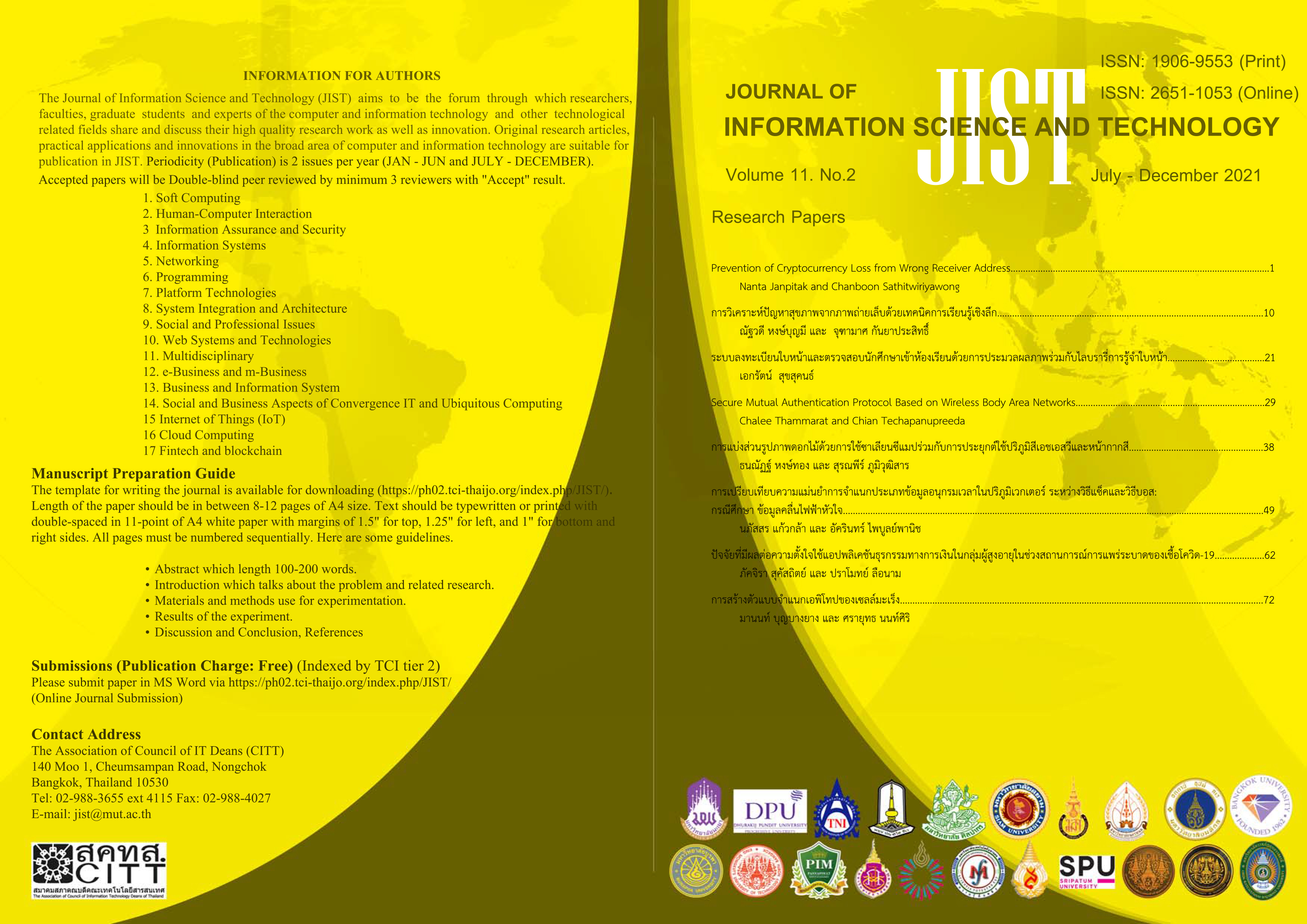Prevention of Cryptocurrency Loss from Wrong Receiver Address
Main Article Content
Abstract
Digital money such as Bitcoin, Ethereum and Litecoin are blockchain-based cryptocurrencies. In today's financial age, many people are holding and trading cryptocurrencies instead of fiat money or other assets. To transfer money in the centralized banking application, the valid receiver will be checked before enable transaction to be process. To transfer cryptocurrency in blockchain network, there are steps to verify the transactions by the blockchain nodes instead of the central authority. However, most of the verification processes are based on sender’s properties such as sender’s digital signature and sender’s account balance compared to the sending amount, etc. There is no process to verify whether the receiver address is valid or not. From this vulnerability, there is a risk that the sender may input the wrong receiver address. If this mistake happens and the transaction has been confirmed, the sender will lose his cryptocurrency without recovery option. The amount will be transfer to that receiving address, but we cannot know that it is belong to whom or may not belong to anybody. There are many topics in cryptocurrency forum and news that the owner cried about losing of their cryptocurrency. Many of them had mistaken input in receiver address. Up until now, there is no mechanism to protect this mistake. In this paper, we propose a process to verify the receiver address using the blockchain API before constructing and submitting the transaction in blockchain application. If the receiver address does not exist in the same blockchain network, there is a process to notify the sender. This process can prevent the loss of cryptocurrency not only from wrong receiver addresses but also from different network addresses.
Article Details
This work is licensed under a Creative Commons Attribution-NonCommercial-NoDerivatives 4.0 International License.
I/we certify that I/we have participated sufficiently in the intellectual content, conception and design of this work or the analysis and interpretation of the data (when applicable), as well as the writing of the manuscript, to take public responsibility for it and have agreed to have my/our name listed as a contributor. I/we believe the manuscript represents valid work. Neither this manuscript nor one with substantially similar content under my/our authorship has been published or is being considered for publication elsewhere, except as described in the covering letter. I/we certify that all the data collected during the study is presented in this manuscript and no data from the study has been or will be published separately. I/we attest that, if requested by the editors, I/we will provide the data/information or will cooperate fully in obtaining and providing the data/information on which the manuscript is based, for examination by the editors or their assignees. Financial interests, direct or indirect, that exist or may be perceived to exist for individual contributors in connection with the content of this paper have been disclosed in the cover letter. Sources of outside support of the project are named in the cover letter.
I/We hereby transfer(s), assign(s), or otherwise convey(s) all copyright ownership, including any and all rights incidental thereto, exclusively to the Journal, in the event that such work is published by the Journal. The Journal shall own the work, including 1) copyright; 2) the right to grant permission to republish the article in whole or in part, with or without fee; 3) the right to produce preprints or reprints and translate into languages other than English for sale or free distribution; and 4) the right to republish the work in a collection of articles in any other mechanical or electronic format.
We give the rights to the corresponding author to make necessary changes as per the request of the journal, do the rest of the correspondence on our behalf and he/she will act as the guarantor for the manuscript on our behalf.
All persons who have made substantial contributions to the work reported in the manuscript, but who are not contributors, are named in the Acknowledgment and have given me/us their written permission to be named. If I/we do not include an Acknowledgment that means I/we have not received substantial contributions from non-contributors and no contributor has been omitted.
References
S. Nakamoto, “Bitcoin: A peer-to-peer electronic cash system,” 2008. [Online]. Available: https://Bitcoin.org/ Bitcoin.pdf.
Ethereum. [Online]. Available: https://www.ethereum.org.
Litecoin - Open source P2P digital currency. [Online]. Available: https://litecoin.org/
Monero - secure, private, untraceable. [Online]. Available: https://www.getmonero.org/
Dash - Dash is Digital Cash You Can Spend Anywhere. [Online]. Available: https://www.dash.org/
A. M. Antonopoulos, “Mastering Bitcoin: Unlocking Digital Cryptocurrencies,” 1st ed. Sebastopol, CA, USA: O’Reilly Media, Inc., 2014.
Testnet Ropsten (ETH) Blockchain Explorer. [Online]. Available: https://ropsten.etherscan.io/
Metamask, Brings Ethereum to your browser [Online]. Available: https://metamask.io
N. Amarasinghe, X. Boyen, and M. McKague. “A Survey of Anonymity of Cryptocurrencies,”. In Proceedings of the Australasian Computer Science Week Multiconference (ACSW 2019). ACM, New York, NY, USA.
M. Conti, E. Sandeep Kumar, C. Lal and S. Ruj, "A Survey on Security and Privacy Issues of Bitcoin," in IEEE Communications Surveys & Tutorials, vol. 20, no. 4, pp. 3416-3452, Fourth Quarter 2018.
Q. ShenTu and J. Yu, “Research on anonymization and deanonymization in the Bitcoin system,” arXiv preprint arXiv:1510.07782, Oct. 2015.[Online]. Available: https://arxiv.org/abs/1510.07782.
Y. Liu, X. Liu, L. Zhang, C. Tang, and H. Kang, “An efficient strategy to eliminate malleability of Bitcoin transaction,” 2017 4th International Conference on Systems and Informatics (ICSAI), Hangzhou, 2017, pp. 960-964.
A. R. Sai, J. Buckley and A. Le Gear, “Privacy and Security Analysis of Cryptocurrency Mobile Applications,” 2019 Fifth Conference on Mobile and Secure Services (MobiSecServ), Miami Beach, FL, USA, 2019, pp. 1-6.
Bitcoin talk. If i send my Bitcoins to a wrong address, what happens? [Online]. Available: https://Bitcointalk.org/index.php?topic=21127.0.
Coinbase Q&A. “I sent funds to the wrong address. How do I get them back?” [Online]. Available: https://support.coinbase.com/customer/en/portal/articles/1404411-i-sent-funds-to-the-wrong-address-how-do-i-get-them-back-.
Quora. “What happens if I send my Bitcoin to an incorrect address?” [Online]. Available: https://www.quora.com/What-happens-if-I-send-my-Bitcoin-to-an-incorrect-address.
Official Go implementation of the Ethereum protocol. [Online]. Available: https://geth.ethereum.org/.
Ethereum JavaScript API. [Online]. Available: https://github.com/ethereum/web3.js/



